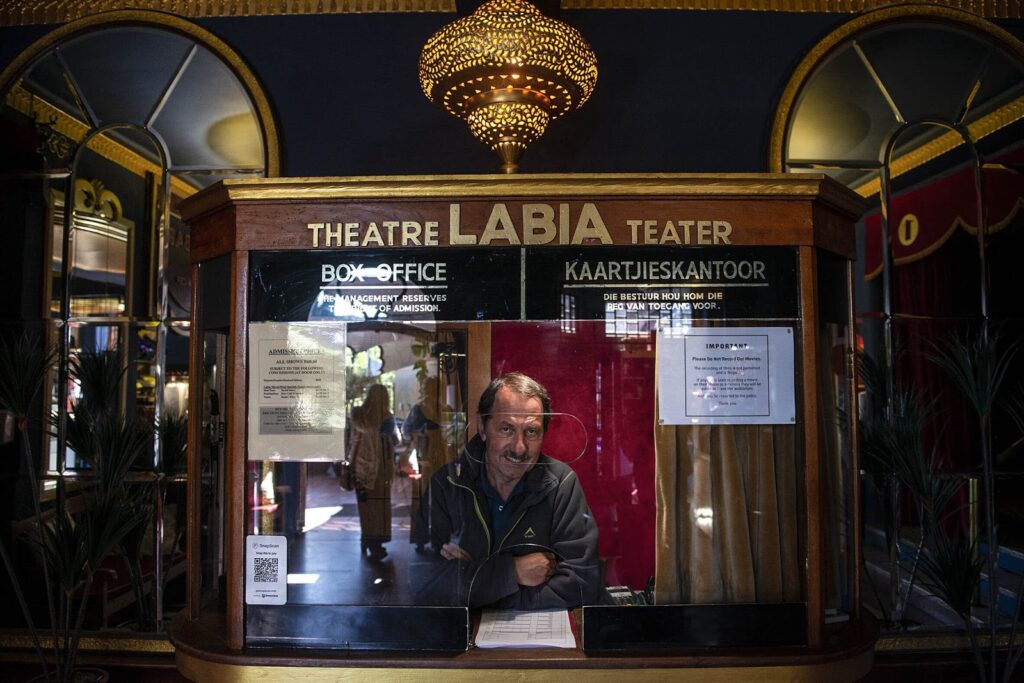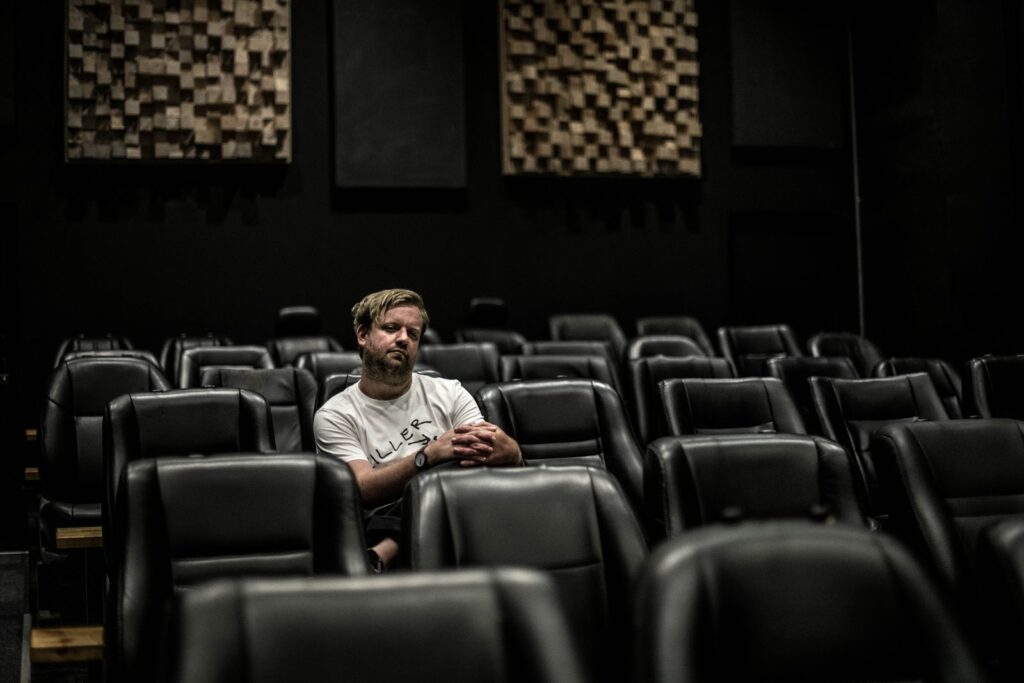Film director Rethabile Ramaphakela and her sister Katleho released their romcom, Seriously Single, on Netflix, after it could not screen in cinemas. (Photo: Paul Botes)
The South African romcom Seriously Single was initially supposed to be released on the big screen, before its release in July on the streaming platform Netflix. The directors of the movie, siblings Katleho and Rethabile Ramaphakela, had a release date set.
It was on 1 May 2020 that they hoped that a flock of moviegoers would come to watch their romantic comedy. But the pandemic hit and, before reaching the fifth month of the year, people were relegated to staying at home so the virus could be curbed — normalcy had disappeared and moviegoers were forced to watch films at home.
Luckily for them, Netflix had seen Ramaphakela’s film and liked it. So when the novel coronavirus hit South Africa, the siblings signed a deal to put their film on their platform. “As filmmakers, you always want the whole world to watch your films, so we got the opportunity to be streamed in over 190 countries, and the film did well, literally because of Covid-19,” said Rethabile.
She added that this experience provided a different perspective on how her and her sister can distribute their films in the future. “We would have loved to be in cinema, but it’s good to know there are other ways we could distribute our work,” she said.
But this good fortune has not been the experience of the entire film industry. In October, The Guardian reported that Oscar-winning film directors James Cameron, Clint Eastwood and Martin Scorsese, together with cinema owners, wrote to the United States government asking for financial assistance, as they feared for the future of the industry.
Covid-19 meant that studios had to halt production. Many movies, such as The Batman, were postponed, and are now due to be released next year or in 2022.
In the meantime, many people have chosen to consume content on streaming platforms, such as Netflix, Showmax, Apple TV and Amazon. Netflix was able to sign up another 10-million subscribers in the second quarter of this year, bringing its worldwide subscribers at that time to 193- million people.
Although streaming is an alternative way of consuming movies, there is some concern that this has disrupted forever the culture of going to the movies.
Joe Russo, the director of Avengers: Endgame, was quoted in a New York Times feature on the future of film as saying: “You’ve got so many options for viewing content that there has to be a need for you to leave your home. What is going to drive you to do that?”
South African thespian and filmmaker Salamina Mosese said she thinks that, in many ways, the pandemic may have accelerated what was a natural trend towards in-home viewing. “The level of the crisis and the uncertainty facing the whole industry means it is difficult to contemplate the future at this moment in time. Covid-19 has shaken worldviews, making people question what matters,” she said.
 Ludi Kraus said the past two years before Covid-19 hit were the best years ever since the Labia was established in 1998. (Photo: David Harrison)
Ludi Kraus said the past two years before Covid-19 hit were the best years ever since the Labia was established in 1998. (Photo: David Harrison)
Although there is uncertainty about the future of film, Ludi Kraus, owner of the Labia, an independent movie house in Cape Town, said that cinemas went through two world wars and the advent of television and, even in these changing times, he believes the industry will make it.
“When television was first introduced into South Africa, people thought it was the end of cinemas,” Kraus said, adding that when programmes like the World At War were broadcast in the 1970s, everybody stayed at home to watch.
The smoking restrictions were also cause for concern (smoking in cinemas was banned in South Africa in 1965). “The people said: ‘If I cannot smoke then I am not going.’ There was a huge resistance because of smoking. But now if you think of a person smoking in the cinema, you would be horrified.”
Lynne Wylie, head of marketing at Ster-Kinekor, said that it is taking time to get back to sound trading levels, with people only now starting to build up confidence in the Covid-19 health protocols. But Wylie said that the cinema chain has seen constant growth since reopening in September 2020, and that the industry as a whole is currently trading at levels of between 10% and 15% compared to last year.
“The week-on-week growth also shows that people are becoming more comfortable, as we saw in the restaurant trade when they reopened. We are confident that audiences will return, but that could take a few months still, as content is currently also not flowing at normal rates,” Wylie said.
Kraus said the past two years before Covid-19 hit were the best years ever since the Labia was established in 1998. The cinema had to close from March when the first lockdown was announced, and reopened on 21 August.
Luckily, independent cinema houses such as the Labia do not have to concern themselves with new content coming in from Hollywood, because they can screen any movies and documentaries. Owing to this factor, Kraus said audiences at the Labia are at about 40% of pre-lockdown levels.
To be relevant and cater to its patrons who do not want to go out, the Labia has also launched a streaming service, allowing customers to watch films and other content showing at the cinema from the comfort of their own homes.
“I think we have a future, and it will be a mountain to climb. But there will always be a place for people to go out,” Kraus said.
He said cinemas such as the Labia offer an experience that makes people want to leave their houses and watch a movie. “There is magic in the air, there is history; their environment is old school, like back in the days of the bioscope,” he said.
 Russell Grant, the owner of the Bioscope at 44 Stanley, Johannesburg, believes the future of cinema lies in the boutique experience. (Photo: Paul Botes)
Russell Grant, the owner of the Bioscope at 44 Stanley, Johannesburg, believes the future of cinema lies in the boutique experience. (Photo: Paul Botes)
Russell Grant, owner of the Bioscope, which is now located at 44 Stanley in Johannesburg, said small cinemas sit at “a different table” and do not have the content constraints of big chains. In the Bioscope’s first week of reopening in August, it screened Loving Vincent, a 2017 experimental animated biopic about the life of the painter Vincent van Gogh.
The Bioscope also offers concept nights, for example, classic movie Sundays, or screening a cheesy movie that comes with all-you-can-eat pizza. These bring customers in. “The future of cinema is probably more in places like the Bioscope, in a more small boutiquey experience”, Grant said. “Small, boutique experiences like the Bioscope or iMax where you can watch a movie and there’s the best sound.” He said the future is going to be based on those two extremes.
Mosese said that perhaps the future of cinema will increasingly depend on what movies are shown when Covid-19 is no longer a threat for audiences.
She said cinemas are in a fight for survival. The consequences of the current situation could mean that people all over the world will shift their attitudes wholly towards streaming platforms and the big studio houses and independent film producers could forever change their views on theatrical windows.
“So, the cinema may have to adapt quickly or face very real extinction,” Mosese said. “On the ground though, I think most avid moviegoers will feel that as long as their safety can be guaranteed to a certain extent, they will go back to enjoying the cinema-going experience.”
Ramaphakela said what the cinemas can do is sell you an experience, which is what more of them need to start doing.
“There are some cinemas that have a bar, with a reclining seat, then it’s a date night and you can do things. That is where cinemas should be moving towards,” she said.
Echoing Grant’s views, Ramaphakela said that cinemas cannot now say, ‘come watch this blockbuster movie’; instead, they need to sell you an experience you cannot replicate at home.
Tshegofatso Mathe is an Adamela Trust business reporter at the Mail & Guardian